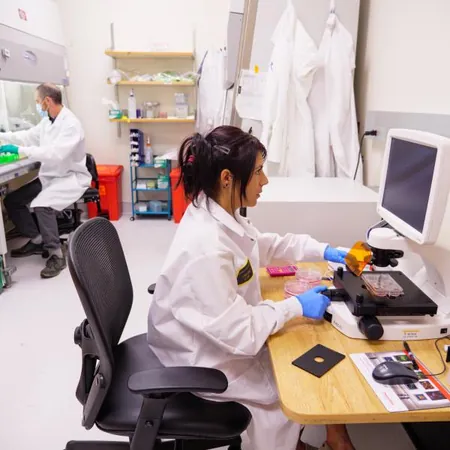
The Hidden Key to COVID Severity Revealed: Are You at Risk?
2024-12-12
Author: Arjun
Introduction
Have you ever wondered why COVID-19 affects some individuals so much more severely than others? Recent research from CU Boulder offers compelling insights into this crucial question, highlighting the role of the interferon pathway—a vital component of our immune response.
The Role of Interferon
When our cells detect an infection like COVID-19, they release a protein called interferon that signals other cells to ramp up their defenses. Unfortunately, when this signaling process malfunctions—either becoming too weak or overly aggressive—it can lead to severe outcomes, including Long COVID. Such disruptions in the interferon pathway have also been linked to autoimmune diseases and certain cancers.
Breakthrough Research
Despite ongoing research, the precise reasons behind these immune misfires remained largely elusive—until now. In a groundbreaking study published in the journal Cell, researchers uncovered what they refer to as an “immune system tuning dial” that likely emerged from ancient genetic changes. “We’ve discovered an entire class of underappreciated protein variants that can significantly impact immune function,” explains Ed Chuong, assistant professor at CU Boulder and senior author of the study.
Exploration of IFNAR2
The researchers focused on a specific variant of the interferon receptor protein known as IFNAR2, which appears to regulate interferon signaling by acting like a tuning dial. “If we can manipulate this dial, we could open the door to new therapies for a range of issues, from infections to autoimmune disorders and cancer,” Chuong added.
From Bug to Feature: How Evolution Shapes Our Genetics
What’s particularly fascinating is how evolution has transformed a genetic anomaly into a potential health asset. Chuong’s research investigates transposons—DNA sequences that can change positions within the genome. These elements, some dating back tens of millions of years, were once dismissed as mere “junk DNA.” However, his work suggests that they might play vital roles in immune function.
Significance of Genetic Variants
By analyzing advanced genetic sequencing data, the researchers identified 125 variants across 99 genes, challenging the long-held belief that transposons serve no significant purpose. Their focus on IFNAR2 revealed a unique “short” variant of the protein that could detect interferon but lacked the components to relay the signal effectively. This variant seemed to act as a “decoy” in the immune response, disrupting normal signaling pathways. In experiments, cells with this short variant were found to have reduced sensitivity to interferon. When the variant was eliminated from the genome, the cells mounted a much stronger immune response against viral threats, including SARS-CoV-2.
Implications for COVID-19 Severity
The implications of these findings are wide-ranging. Variations in IFNAR2 levels among individuals could explain why some experience moderate COVID-19 symptoms while others suffer severe cases. High levels of the short variant may predispose individuals to more severe infections, while low expression may lead to chronic inflammation or autoimmune disorders, including conditions like psoriasis or irritable bowel syndrome.
Therapeutic Opportunities
“There are documented differences in immune responses among individuals, but the root causes remain unclear. Our study uncovers a new control dial that might explain some of this variability,” Chuong states.
Future Directions
The research team has already filed a provisional patent and is actively developing compounds to manipulate this immune dial. They believe that the revelations about IFNAR2 are just the beginning; there may be numerous other immune functions governed by similarly overlooked genomic elements.
Conclusion
The research underscores an essential message: exploring the uncharted areas of our genome could lead to transformative discoveries aimed at enhancing human health and combating diseases ranging from COVID-19 to autoimmune disorders. As we navigate ongoing public health challenges, such breakthroughs will likely prove invaluable in tailoring personalized treatment strategies for those most at risk. Stay tuned—it appears that the quest for understanding our immune systems is only just beginning!


 Brasil (PT)
Brasil (PT)
 Canada (EN)
Canada (EN)
 Chile (ES)
Chile (ES)
 España (ES)
España (ES)
 France (FR)
France (FR)
 Hong Kong (EN)
Hong Kong (EN)
 Italia (IT)
Italia (IT)
 日本 (JA)
日本 (JA)
 Magyarország (HU)
Magyarország (HU)
 Norge (NO)
Norge (NO)
 Polska (PL)
Polska (PL)
 Schweiz (DE)
Schweiz (DE)
 Singapore (EN)
Singapore (EN)
 Sverige (SV)
Sverige (SV)
 Suomi (FI)
Suomi (FI)
 Türkiye (TR)
Türkiye (TR)